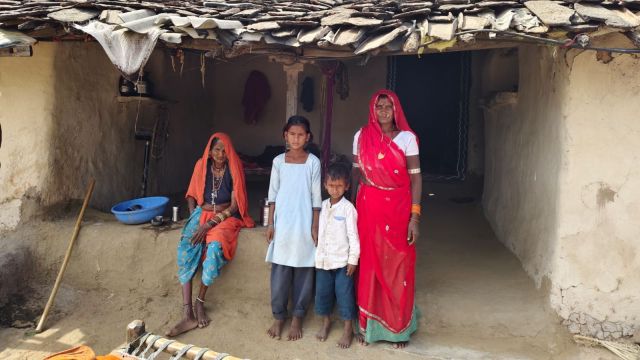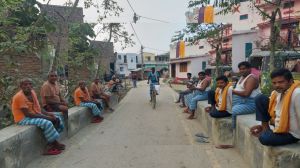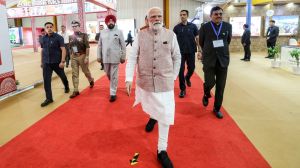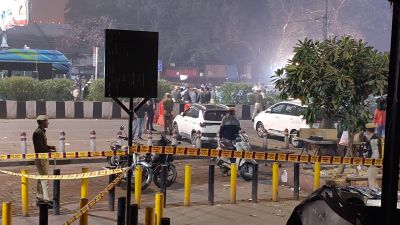A tribal divorce custom is posing a peculiar challenge to PM Awas Yojana in Rajasthan
The Natha Pratha is a tribal custom that allows a married woman to legitimise her relationship with a man who's not her spouse. But officials say that the tradition is causing work under the affordable housing scheme to stall
 Hundi Meena and her grandchildren at their home in Salumbar's Matasul village (Express Photo/Parul Kulshrestha)
Hundi Meena and her grandchildren at their home in Salumbar's Matasul village (Express Photo/Parul Kulshrestha)When Pema Meena, 52, a tribal from Morella village in Rajasthan’s Salumbar district decided to apply for under the central government’s Pradhan Mantri Awas Yojana Gramin affordable housing scheme, all he wanted was financial assistance to build what he had always dreamed of – a pucca home. But what he didn’t account for was that his estranged wife, who had divorced him months before through the tribal ‘Nata Pratha’ custom, would be considered primary beneficiary under the scheme and receive the money too.
“My ex-wife left me in the beginning of 2024 but official documents such as Aadhaar still show her as my wife. I want her name removed but officials ask for an official divorce decree. This is a tribal area, and we don’t register marriages and divorces here,” Pema, who has since been doing the rounds of government offices to get the records changed, tells The Indian Express.
Pema Meena represents a peculiar problem faced by many in the tribal areas of Rajasthan. According to government officials, the ‘Nata Pratha’ – a tribal custom that allows a married woman to live with a man who’s not her spouse – have led to stalling of work of a significant portion of PM Awas houses sanctioned in the state’s tribal areas.
Practiced in the predominantly tribal areas of Salumbar Banswara, Dungarpur, Pratapgarh, Udaipur, Sirohi, Rajsamand, Pali, and Chittorgarh, the custom allows for a woman to formally declare before the village panchayat that she is leaving her spouse to live with another man.
According to government sources, nearly 5-10 percent of the 1.58 lakh houses sanctioned in these areas are stalled because of the widely-practised custom. This assumes particular significance at a time when the Rajasthan government is conducting a drive to identify more eligible beneficiaries under the scheme.
 Pema Meena, 52, applied for the PM Awas Yojana Gramin scheme after his wife left him, little knowing she would still be its primary beneficiary (Express Photo/Parul Kulshrestha)
Pema Meena, 52, applied for the PM Awas Yojana Gramin scheme after his wife left him, little knowing she would still be its primary beneficiary (Express Photo/Parul Kulshrestha)
“We have to fulfil our targets under PM Awas Yojana, and in the tribal areas, this customary practice has become a problem,” Dinesh Patidar, the Block Development Officer at Jhallara Panchayat Samiti in Salumbar district, says, adding that they have also written to the state government regarding the problem. “We have had several instances when ex-husbands of women who did nata claim that they are divorced and are entitled to financial assistance under the scheme. However, without a divorce decree, our hands are tied. Many houses in these areas are unfinished due to this reason and higher officials still haven’t been able to find a solution.”
The ‘unique’ tribal problem
Launched by the Narendra Modi government in 2015 in place of the Indira Awas Yojana, the Pradhan Mantri Awas Yojana is a credit-linked subsidy scheme to help provide affordable housing. Under the scheme, beneficiaries are identified through a three-step verification process that involves taking into account the Socio-Economic Caste Census (SECC 2011) and a 2018 Awas survey, gram sabha approval, and geo-tagging.
Financial assistance of Rs 1.20 lakh (in plain areas) and Rs 1.30 lakh (in hilly/inaccessible areas) is sent to the Aadhaar-linked bank accounts of identified beneficiaries, who must fulfil 10 conditions — including not falling within the tax bracket, not owning vehicles and not owning more than five acres of land.
Women are primary beneficiaries under the scheme, meaning that, under the rules, they must either be listed as the sole owner or the joint owner of the house being built under the scheme, except when there is no adult woman in the family.
According to the 2011 Census, tribals are estimated to form 13.48 percent of the state’s population, and Pappulal Meena, the sarpanch of Matasul village in Salumbar, believes cases such as Pema’s are not uncommon.
“Since many tribals are poor and unlettered, they don’t take the legal recourse to resolve the problem,” he says.
Data from the Rajasthan government shows 98.4 percent work of the houses sanctioned under the PM Awas Yojana between 2016-17 to 2021-22 is now complete. With only a small portion of the 17,15,249 houses sanctioned during that period still incomplete, officials from the state government claim that although they have written to the Union Rural Development Ministry, the problem “is not taken seriously”.
“This problem is present only in tribal regions of Rajasthan, but we are the ones who are answerable for the incomplete houses under the Awas scheme. We have written to the central government and even raised the issues at meetings with them but they haven’t taken the issue seriously,” one official quoted earlier says, adding that a solution must keep in mind tribal customs.
When contacted, the Union Rural Development Ministry, under which the scheme comes, said they were unaware of the problem.
With no immediate resolution, district officials are trying to sort out these issues at the village level.
“We approach the panchayat that wields significant influence over the area and ask them to summon the woman who has done nata and in whose account money has been transferred,” one BDO says. “We use that pressure to get her to transfer the money to the ex-husband’s account. This takes about a month and typically involves multiple meetings but it’s generally successful. But apart from this, there’s no solution.”
Meanwhile, several beneficiaries are still left in a lurch. Among them is Hundi Meena, a 62-year-old who lives in Matasul in Salumbar. After Hundi’s 30-year-old son Ramesh Meena died in October 2023, his wife Shanta, 25, went to live with another man in a neighbouring village, leaving Hundi to look after the couple’s three minor children.
Since Shanta was the primary beneficiary under the Awas Yojana, for which the family had applied before she left, the first installment of Rs 15,000 was sent to her account, says Hundi.
“With the help of the sarpanch, I was able to stop more installments being sent to her account, but officials are not adding my name,” she says.







